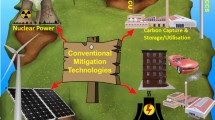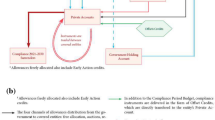Abstract
Economic analyses have produced widely differing estimates of the economic implications of policies for greenhouse gas (GHG) mitigation, ranging from high costs to modest benefits. The main reason for the differences appears to be differences in approaches and assumptions. This paper analyzes the extent to which the post-SRES1 (after the IPCC Special Report on Emissions Scenarios) model results for the global costs of GHG mitigation can be explained by the model’s characteristics and the assumptions adopted. The research applies meta-analysis methodology combined with scatter plots of the data to identify the ranges of the results and outlying data points. A database of scenarios and results was compiled for the post-SRES scenarios, which has the major advantage that all seven models for which suitable data are available have been run using the same, independently defined scenarios. The results are strongly clustered, with only a few results outside the range of −4% to 0% gross domestic product (GDP), with a strong correlation between CO2 reduction and GDP reduction. A set of model characteristics is found to be highly significant (1% level), explaining some 70% of the variance. The main conclusion is that all modeling results regarding “GDP costs of mitigating climate change” should be qualified by the key assumptions leading to the estimates. The treatment of these assumptions can lead to the mitigation being associated with increases in GDP or with reductions.
Similar content being viewed by others
References
Azar C (1998) Are optimal CO2 emissions really optimal? Four critical issues for economists in the greenhouse. Environmental & Resource Economics 11:301–315
Barker T (1998) Large-scale energy-environment-economy modelling of the European Union. In: Begg I, Henry B (eds) Applied economics and public policy. Cambridge University Press, Cambridge
Barker T, Ekins P (2001) How high are the costs of Kyoto for the US economy? Tyndall Centre working paper no. 4, Norwich, UK, www.tyndall.ac.uk
Barker T, Köhler J (1998) Equity and ecotax reform in the EU: achieving a 10% reduction in CO2 emissions using excise duties. Fiscal Studies 19:375–402
Barker T, Rosendahl KE (2000) Ancillary benefits of GHG mitigation in Europe: SO2, NOx and PM10 reductions from policies to meet Kyoto targets using the E3ME model and EXTERNE valuations’, Ancillary Benefits and Costs of Greenhouse Gas Mitigation, Proceedings of an IPCC Co-Sponsored Workshop, March, 2000, OECD, Paris.
Burniaux JM, Martin JP, Nicoletti G, Oliveira-Martins J (1992) GREEN: a multi-region dynamic general equilibrium model for quantifying the costs of curbing CO2 emissions: a technical manual. Working paper no. 116. Economics and Statistics Department, OECD, Paris
Carraro C, Hourcade JC (1998) Climate modelling and policy strategies: the role of technical change and uncertainty. Energy Economics 20:463–471
Cline W (1992) The economics of global warming. Institute for International Economics, Washington, DC
Cooper A, Livermore S, Rossi V, Walker J, Wilson A (1999) Economic impacts of reducing reducing carbon emissions: the Oxford model. Energy Journal Special Issue:335–365
DeCanio SJ (1997) Economic modeling and the false tradeoff between environmental protection and economic growth. Contemporary Economic Policy 15(4):10–27
Dowlatabadi H (1998) Sensitivity of climate change mitigation estimates to assumptions about technical change. Energy Economics 20:473–493
Grubb M, Köhler J, Anderson D (2002) Induced technical change in energy and environmental modeling: analytic approaches and policy implications. Annual Reviews of Energy and the Environment 27:271–308
IPCC (1996a) The science of climate change, Vol 1 of Climate Change. IPCC Second Assessment Report. Cambridge University Press, Cambridge, UK
IPCC (1996b) Climate change, Vol 3: Economic and social dimensions of climate change. IPCC second assessment report. Cambridge University Press, Cambridge, UK
IPCC (2001) Climate Change 2001 Synthesis Report. A contribution of Working Groups, I, II and HI to the Third Assessment Report of the IPCC [Watson RT and the core writing team (eds)]. Cambridge University Press, Cambridge, UK
Judge G, Hill RC, Griffiths WE, Lütkepohl H, Lee T-C (1988) Introduction to the theory and practice of econometrics. Wiley, New York
Mabey N, Hall S, Smith C, Gupta S (1997) Argument in the greenhouse: the international economics of controlling global warming. Routledge, London
Manne AS, Richels RG (1990) The costs of reducing U.S. CO2 emissions: further sensitivity analyses. Energy Journal 11(4):69–78
Manne AS, Richels RG (1992) Buying greenhouse insurance: the economic costs of CO2 emission limits. MIT Press, Cambridge, MA
McKibbin W, Ross M, Shackleton R, Wilcoxen P (1999) Emissions trading, capital flows and the Kyoto Protocol. Energy Journal Special Issue:287–334
Morita T, Nakicenovic N, Robinson J (2000) Overview of mitigation scenarios for global climate stabilization based on new IPCC emission scenarios (SRES). Environmental Economics and Policy Studies 3(1, Special Issue):65–88
Nakicenovic N, Alcamo J, Davis G, de Vries B, Fenhann G, Gaffin S, Gregory K, Grübler A, Jung TY, Kram T, La Rovere L, Michaelis L, Mori S, Morita T, Pepper W, Pitcher H, Price L, Riahi K, Roehrl A, Rogner HH, Sankovski A, Schlesinger M, Shukla P, Smith S, Swart R, van Rooijen S, Vietor N, Dadi Z (2000) IPCC (Intergovernmental Panel on Climate Change) Special report on emissions scenarios, a special report of working group III of the Intergovernmental Panel on Climate Change. Cambridge University Press, Cambridge, UK
Nijkamp P, Pepping G (1998) A meta-analytical evaluation of sustainable city initiatives. Urban Studies 35:1481–1500
Nordhaus W (1994) Managing the global commons: the economics of climate change. MIT Press, Cambridge, MA
Rana A, Morita T (2000) Scenarios for greenhouse gas emission mitigation: a review of modeling of strategies and policies in integrated assessment models. Environmental Economics and Policy Studies 3(1, Special Issue):267–289
Repetto R, Austin D (1997) The costs of climate protection: a guide for the perplexed. World Resources Institute, Washington, DC
Smith VK, Kao Y (1990) Signals or noise? Explaining the variation in recreation benefit estimates. American Journal of Agricultural Economics 72:419–433
Stanley TD, Jarrell SB (1989) Meta-regression analysis: a quantitative method of literature surveys. Journal of Economic Surveys 3:161–170
Toi RSJ (1999) The marginal costs of greenhouse gas emissions. Energy Journal 20(1):61–81
Van den Bergh J-CJM, Button KJ (1997) Meta-analysis of environmental issues in regional, urban and transport economics. Urban Studies 34:927–944
Weyant JP (1993) Costs of reducing global carbon emissions. Journal of Economic Perspectives 7(4):27–46
Weyant JP, Hill J (1999) Introduction and overview. Energy Journal Special Issue:vii–xliv
Author information
Authors and Affiliations
About this article
Cite this article
Barker, T., Köhler, J. & Villena, M. Costs of greenhouse gas abatement: meta-analysis of post-SRES mitigation scenarios. Environ Econ Policy Stud 5, 135–166 (2002). https://doi.org/10.1007/BF03354027
Received:
Accepted:
Published:
Issue Date:
DOI: https://doi.org/10.1007/BF03354027




